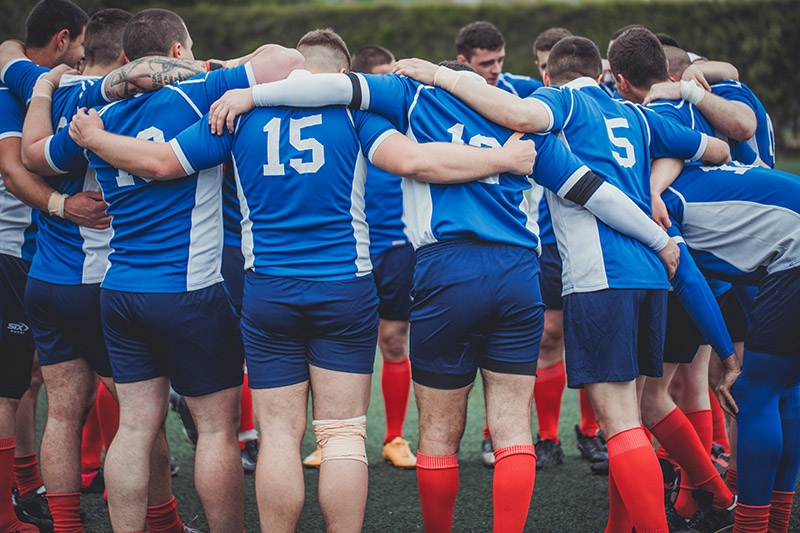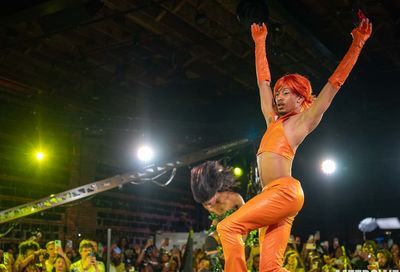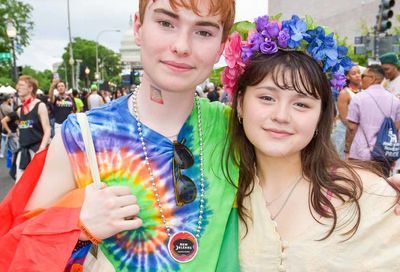Play Ball!
The 27th Annual Gay Softball World Series Comes to D.C.
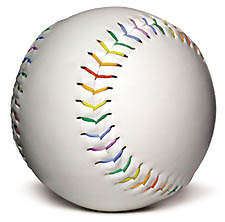 |
You see them in the spring and summer, spread out around the base of the Washington monument or along the playing fields near the Roosevelt memorial. You may even have joined them once, when your office team was short a player, or when you decided to take a whack at getting yourself back into shape.
They’re the softball players.
But in the grand scheme of things athletic, there are softball players, and then there are softball players. They’re the ones with the bumps and scrapes and bruises because they never, ever give up on the ball. They’re the ones who’ve played a field position for a longer time than they’ve been with their life partner. They’re the ones who keep their bats and gloves by the door, ready to go at a moments notice.
They are the serious softball players. And they’re coming to Washington for the 27th Annual Gay Softball World Series.
This marks the first time the North American Gay Amateur Athletic Alliance’s (NAGAAA) series will be played in the D.C. area. The Chesapeake and Potomac Softball League (CAPS), Washington and Baltimore’s gay and lesbian softball group, successfully bid to bring the games to town two years ago, and are now preparing to watch the competition unfold on 12 softball fields in four complexes over five days.
With more than 3,000 gay and lesbian softball players, coaches, umpires and officials from across the nation headed to town, it’s going to be one of the biggest gay sporting events the city will see this year. Not only will the playing fields be full, D.C.’s nightlife scene will be as well, with parties and drag shows and ceremonies overflowing for the week.
But even with all the entertainment and sightseeing, the core of the week still comes down to the game — competing to be one of the best gay softball teams in the nation. And everyone’s ready to play.
For more information about the 27th Annual Gay Softball World Series and related events visit www.series2003.org. For more information about the Chesapeake and Potomac Softball League, visit www.capsoftball.org.
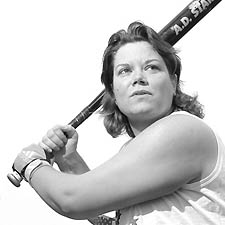 Houseton Houseton |
Bradley Houseton was eleven-years-old when she first played softball. She hasn’t stopped since.
Now 34, Houseton is the director of this year’s Gay Softball World Series, overseeing the massive volunteer effort that has brought thousands of gay and lesbian players to the area to compete for the top trophies in the nation. A native Texan who works as a development director for a medical association in D.C., Houseton is also playing in the series, pitching for D.C. Storm.
“Gay softball is growing,” says Houseton. “As more people find out about it, and we see the success of the local leagues in every community, and how big the world series is getting and how much of a buzz it’s creating, and I think it’s just going to keep getting bigger.”
METRO WEEKLY: You’re originally from Texas — how did you end up in D.C.?
BRADLEY HOUSETON: I grew up in Austin, and I worked there for a few years before I went to Texas A&M University and got a political science degree. I thought the best place for me to be was Washington, D.C., so I came up here in January of 1998. I started looking for a job, but I realized that Hill staffers don’t make that much money. I was older than the traditional person just out of college and I couldn’t imagine having four roommates so I could work on the Hill and make ends meet. I ended up getting a marketing position with an association, then after about three years I got this job.
MW: Before the interview, you said your girlfriend is in
Philadelphia. How did that come about?
HOUSETON: We met through softball. NAGAAA [North American Gay Amateur Athletic Alliance] has business meetings twice a year, one in February and one in August. I met her at the winter business meeting in Portland last year. So the World Series brought us together. She’s the commissioner of the gay softball league in Philadelphia, and I’m the women’s division commissioner of the gay league here. And I’m also director of the World Series here.
MW: How does the local softball league work?
HOUSETON: The open division is actually men’s teams and recreational teams, while the women’s division is women only, or people who identify as a woman. In the open division, teams are divided according to skill levels A, B, C or D. The women’s division teams are divided into competitive, alternative, and a recreational league that is new this year.
MW: What is women’s alternative?
HOUSETON: It’s really just according to skill level. The competitive division is the best players, and alternative is the next best players. The recreational division is not as serious, it’s more about fun. It’s really just whatever you think you are as a team. For the open division it’s different, because they actually have ratings. All the players, whether a guy or a girl, you have to be rated. Their coaches rate them, and the board of directors will watch people play and make sure they’re rated properly. You can get in big trouble with NAGAAA if players are rated wrong at the world series, to the point where they can be removed or membership could be terminated. It’s pretty major consequences.
MW: What’s your role with the World Series?
HOUSETON: A little of everything. It’s my job to make sure all the pieces of the puzzle fit together. The CAPS board asked me if I would be the director two years ago. I was like, “All right, great!” The first thing I did was start thinking about the structure, so I set up a committee for each component: opening ceremonies, closing ceremonies, the fields we play on, nighttime activities, hotel and transportation. We appointed chairs for each of those committees and then we had a whole list of volunteers who wanted to help out. For the last two years we’ve been meeting monthly — the last few weeks we’ve been meeting every week. Basically, it’s been my job to make sure it’s all running properly. It’s been like a second full-time job, really, with lots of late nights for two years.
MW: With so many teams coming, where will all the games be played?
HOUSETON: All of them will be in Prince George’s County, but we’re using four different softball complexes to accommodate the size of the series. When we initially bid for the series, we didn’t know it was going to be this big — we had to go back and add two more complexes. We’re using a total of fifteen fields, And they’ll be running twelve games a day every day for five days.
MW: How many people are you expecting?
HOUSETON: One hundred sixty teams, times about 20 people per team is about 3,200 athletes and coaches. Then we have about 50 umpires, and fourteen NAGAAA officials. We’re going to need about 400 volunteers over the course of the week from the local community. We really want a lot of people to come out.
MW: What kinds of things do you need volunteers to do?
HOUSETON: Making sure that all the dugouts have water, to watch each of the fields so if there’s an injury they can call first aid, or if the umpires need something they can run and get it. We need some people to run help with security and keep an eye on the parking lots and other areas. We need people staffing registration, selling t-shirts, just about anything you can think of.
MW: Are you playing in the tournament as well?
HOUSETON: Yes. I’m not playing with my team, because my team unfortunately didn’t qualify. But another team invited me to come pitch for them, so I’m going to go play for D.C. Storm.
MW: How long have you been playing softball?
HOUSETON: Since I was about eleven-years-old, so for twenty-three years. I started in fast pitch, but then I got into slow pitch when I was about sixteen. I started as a catcher, and I started pitching when I switched to slow pitch.
MW: What do you like best about playing?
HOUSETON: I just like being outside. And I’m a real team sport kind of gal. I like the camaraderie of it. Softball can be very recreational but at the same time you can have some really good games and feel like you were very competitive. So you feel really good walking away, and that’s a cool thing.
MW: When did you first get involved with gay and lesbian softball?
HOUSETON: Not until I moved to D.C., which is weird. Obviously, anywhere there’s sports there’s going to be lesbian women, so we were all playing softball in Austin. But I never even heard of organized gay softball and I saw an ad in D.C. and some friends of mine said let’s throw a team together. Once I started playing, I found out about the Gay Softball World Series — it had been around all these years and I had never heard of it. But I’ve been playing organized gay softball for five years now, which is the coolest thing.
MW: How different is gay and lesbian softball from non-gay softball leagues?
HOUSETON: Gay softball is different because there’s much more of a social aspect. People are more involved in the league, you partner with the community to do things at bars, you do things in the off season together, you have banquets at the end of the season and things like that.
MW: Is it still as competitive, even though there’s a greater social aspect to it?
HOUSETON: It depends on which league you’re looking at. I’d like for the women’s division to become much more competitive. I think there are a lot of women that don’t play for our league because they don’t want to give up a Sunday, or they’re going to tournaments somewhere else so they wouldn’t be here to play in our league anyway. So some really good women tend to not play in our league. The open division is different. I think the men have more of a commitment to gay softball. They’ll give up their Sundays. They look forward to the World Series every year, and they plan their vacations around it.
MW: What is it about softball that keeps you playing — what is it about the game itself that keeps you coming back?
HOUSETON: After you’ve been playing for a while, it’s like any team experience: It feels like your family. You play with the same people for a fair number of years, and it becomes something that your family does. You get out there and play ball and it’s part of what you are. It’s weird, but I’ve been playing for so long that I wouldn’t know what to do if I wasn’t playing softball. It’s just become part of me. I love being outside and being around the people. Now that I’ve been involved in the organizational aspect, I really like looking at what I can do to help with the whole league. I like that a lot. What will probably happen as I get older is I’ll play less but I’ll want to continue to be involved by helping with organizing.
MW: If people come out to volunteer or just watch, what can they expect?
HOUSETON: It’s unfortunate that we’re spread out at four different complexes because you miss the massiveness of it. Last year in Portland it was at two complexes, the year before in San Francisco it was all at one complex. But what they’ll get out of it is an opportunity to meet a lot of new people from all over the country, and part of the energy that goes with any big gay event. It doesn’t feel like a lot of work. I think if people come one day to volunteer they’ll be back every day if they can. It’s just fun — fun to watch and fun to hang out.
MW: What’s the best part of seeing the World Series for you?
HOUSETON: These are the best of the best of gay softball teams across the country. This is not just a weekend tournament where you scrape together three hundred bucks for your team and drive over to play for the weekend. I’m just excited about the level of skill that’s going to be on the field, and it’s fun to watch. What surprised me most when I learned about gay softball is how many gay guys play softball, and they’re good. They’re so much fun to watch. The women are, too, but I’ve always watched women play softball. Watching the guys play is new for me, and it’s really fun.
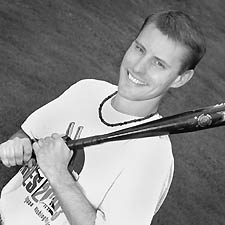 Sprague Sprague |
As a database developer for research programs at Children’s National Medical Center, Bruce Sprague has an eye for detail. It’s a skill that serves him well as secretary for CAPS, as well as the committee chairman for the World Series closing ceremonies to be held next Saturday night at Nation.
An avid high school athlete — he had a sport for every season — Sprague only came to softball after moving to D.C., when he was recruited on the basis of his past baseball experience. He quickly fell in love with the sport, not mention his softball-playing partner. A veteran of the annual world series competitions, he’s playing this year with D.C. Nitro.
METRO WEEKLY: What do you do as the CAPS secretary?
BRUCE SPRAGUE: In the winter we work on getting new people into the league, assessing people’s skill levels to see what types of team they might be best suited for, and putting them in touch with coaches. Once people get registered and the league starts up in May, it’s about getting the schedule out and sending weekly e-mails about the games and other events, all the who, what, when, where and how stuff. We have twelve open division teams and seven women’s division teams, so we have about 350 members. We’re a pretty big organization.
MW: What do you have planned for the closing ceremonies?
SPRAGUE: It’s an opportunity to hand out the trophies to the teams that won, to recognize the people who are being accepted into the organization’s Hall of Fame. This year we’re doing it at Nation. They sponsor of a team in the league and they made us a very nice offer to be able to hold the event there. We’re going to do the buffet on the outdoor patio, and then we’ll move everybody into the main hall for the recognition of the Hall of Fame people, the organizer’s remarks, and the trophy presentations. Then they open up the house to the regular crowd — it’s regular Velvet Nation night. It will be a nice segue from softball trophies to dance music.
MW: What do you look forward to most about the closing ceremonies?
SPRAGUE: Handing out trophies. That’s where all the energy is, that’s where people get excited, that’s why we’re here. It’s most fun to see people go onstage and get trophies and feel good about how they performed that week.
MW: Are you playing in the series as well as organizing?
SPRAGUE: I am. My team didn’t qualify — the JR.’s Gamecocks were the B division champion this year, but in the qualifying tournament we didn’t win a game. The weekend when we had to win a game we couldn’t. The two teams representing the CAPS B division are the D.C. Nitro, who’s sponsored by Nation and the Crew Club, and the D.C. Eagle team. I’m playing for the Nitro, so I do get to play this year.
MW: What are you looking forward to most about the world series itself?
SPRAGUE: Getting out and playing and seeing friends from other cities. I’ve been playing since 1995 and I’ve been to four or five different world series, so I’ve started to make some friends around the country. But I like to get out there and play and see what people from other cities have to offer on the playing field, and see how you’d stack up against the boys from San Francisco or Kansas City or Ft. Lauderdale.
MW: On a scale of one to ten, with one being very casual and ten being very aggressive on the competitive scale, where would you put yourself?
SPRAGUE: I’m probably a closet seven. I’m very competitive on the inside, and the downside of that is that I’m one of those people who get terribly anxious before a ball game because I want to perform well and don’t want to let my teammates down. So on the inside I’m very competitive, but if you asked my teammates they’d probably say I’m pretty low key.
MW: Did you play softball before you started in the gay leagues?
SPRAGUE: I didn’t play softball before that, but I grew up playing little league baseball. I played right up until I was sixteen-years-old in public leagues and that sort of stuff, although I was never good enough to try out for the high school team — I’m too small. When I came down here [to D.C.], somebody at my gym was recruiting new players and asked a housemate of mine to play. My housemate said, “I throw like a girl, but my friend over there used to play ball, why don’t you ask him?” So I went out and played a little. It was fun just to get back to something that I grew up playing and liked to do. Plus it was a nice chance to meet some new people.
MW: What position did you play in little league?
SPRAGUE: I played infield when I was little, but I got hit in the face by a bad bounce. That sort of scared me and I kept pulling up my head on ground balls. So I figured I was a better outfielder. Plus, I’ve got a lot of speed. That’s my secret weapon, my speed. My teammates call me Cheetah.
MW: Were sports a big part of your life growing up?
SPRAGUE: They were a big component. I played tennis in the fall, I ran indoor track in the winter one year, and I played ball every spring. My sister played softball when she was a kid. My family enjoyed sporting events — it was a place to hand out with mom and dad and my sister. So, yeah, it was important. Also I was a clarinet player in high school, so I tried to balance my athletic pursuits with my artistic pursuits, and find a happy medium.
MW: A lot of people go through phases where they played sports before they came out, but after coming out they stop playing and are sometimes surprised that there’s such a large segment of the community involved in sports. Were you surprised by the number of people playing?
SPRAGUE: To some degree. Before I found softball, I always went to pride events and knew that there were organizations out there, but I don’t know if I wasn’t brave enough or just not interested enough at the time to join them. Then somebody asked me to play and that’s what got me in. It was nice to find out that there were people with good skills, too. A lot of people who are new to the league and don’t know anything about it assume that the boys in the league must be pushovers, a wimpy sort of thing. That’s not the case at all. I played with the Nitro team in an Arlington [non-gay] league and last weekend we won the season tournament. My partner’s team plays at the highest skill level against big bomber teams, and they won their end of the year tournament against a team with Marines, and they looked the part.
MW: Did you meet by playing softball?
SPRAGUE: We did. It was a nice romantic first meeting. He was friends with the guy who asked me to play. A couple weeks after we met at a practice I gave him a ring on the telephone and we chatted, a couple weeks after that we went on a first date. We had a couple hiccups in between, but now it’s been eight years. He can compete at the highly skilled level because he’s six-and-a-half feet tall and a couple hundred pounds and has a beautiful swing. He’s a good ballplayer.
MW: What do you like best about the game itself? What is it about playing softball that keeps you coming back?
SPRAGUE: That there’s never any guarantee when you’re swinging the bat. If you could do it consistently all the time, then it would probably get boring. But for some reason when you step up to the bat, maybe the last time you flew out, but the next two times you hit a line drive up the middle. I haven’t figured it out enough to know what I’m doing right on some of those swings and what I’m not doing right on the others. I like trying to figure those sorts of things out for my game, trying to get a better handle on it. Plus, it’s just fun in the spring and the summer to be outside, rolling around in the grass and getting dirty. It feels good, it smells good, it’s just a great way to be outside and be with friends. That’s what’s most fun about it.
Support Metro Weekly’s Journalism
These are challenging times for news organizations. And yet it’s crucial we stay active and provide vital resources and information to both our local readers and the world. So won’t you please take a moment and consider supporting Metro Weekly with a membership? For as little as $5 a month, you can help ensure Metro Weekly magazine and MetroWeekly.com remain free, viable resources as we provide the best, most diverse, culturally-resonant LGBTQ coverage in both the D.C. region and around the world. Memberships come with exclusive perks and discounts, your own personal digital delivery of each week’s magazine (and an archive), access to our Member's Lounge when it launches this fall, and exclusive members-only items like Metro Weekly Membership Mugs and Tote Bags! Check out all our membership levels here and please join us today!








